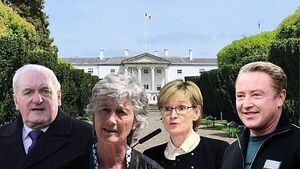Explained: What powers does the President of Ireland have?

Eva Osborne
As the 2025 presidential election draws near, the race to Áras an Uachtaráin is evolving into a strikingly dynamic contest.
Established political figures like Catherine Connolly and Mairead McGuinness are lining up alongside unconventional candidates, like Riverdance star Michael Flatley, to succeed outgoing President Michael D Higgins.
The Irish presidency is not as powerful as presidencies in other countries, like the United States or France, but the Irish President has their own responsibilities.
So, what powers does the President of Ireland have? And what is their role?
The President of Ireland (Uachtarán na hÉireann) is Ireland's Head of State.
The Office of President was established by the Constitution (Bunreacht na hÉireann). The President is elected directly by the people and serves a seven year term in office.
The formal powers and functions of the President are prescribed in the Constitution.
Many of the powers of the President can only be exercised on the advice of the Government, but the President has absolute discretion in other areas.
The President's powers include:
- Appointment of the Taoiseach, members of the Government, judges and other officials;
- Summoning and dissolving the Dáil, and convening the Oireachtas;
- Signing legislation into law and/or referring Bills to the Supreme Court;
- Representing the people of Ireland;
- Acting as Supreme Commander of the Defence Forces.
Appointments and the Oireachtas
The President appoints the Taoiseach on the nomination of Dáil Éireann; and the other members of the Government on the nomination of the Taoiseach, after Dáil approval.
Other office holders appointed by the President, on the advice of the Government, include Judges, the Attorney General, the Comptroller and Auditor General, and Commissioned officers of the Defence Forces.
The President summons and dissolves Dáil Éireann on the advice of the Taoiseach.
If a Taoiseach no longer has the support of the majority of Dáil Éireann, the President may choose to call for fresh elections, by signing a proclamation dissolving the Dáil.
However, the President may also refuse to dissolve the Dáil, in which case members of the Dáil must nominate an alternative Government. Since the foundation of the State, this power of refusal has never been exercised, President.ie pointed out.
Following a general election, Dáil Éireann is summoned by the President, on the advice of the Taoiseach. The President must follow the advice of the Taoiseach.
Legislation
Bills passed by the Houses of the Oireachtas must be signed by the President of Ireland before they become law.
Under the provisions of Article 25 of Bunreacht na hÉireann, a bill can only be signed by the President on the 5th, 6th, or 7th day after it is presented for their signature, but there are some situations when the President may sign a Bill earlier.
Under Article 25.2.2 of the Constitution, the Government, with the prior concurrence of the Seanad, can request earlier signature, providing the President with the option of signing the bill earlier than the 5th day.
The Constitution also provides the President with the power to refer certain Bills to the Supreme Court for a determination as to whether the bill or any provision thereof is repugnant to the Constitution.
Should such a Constitutional issue arise, the President must consult with the Council of State prior to making such a referral.
The decision whether to refer a Bill to the Supreme Court is the President's alone.




